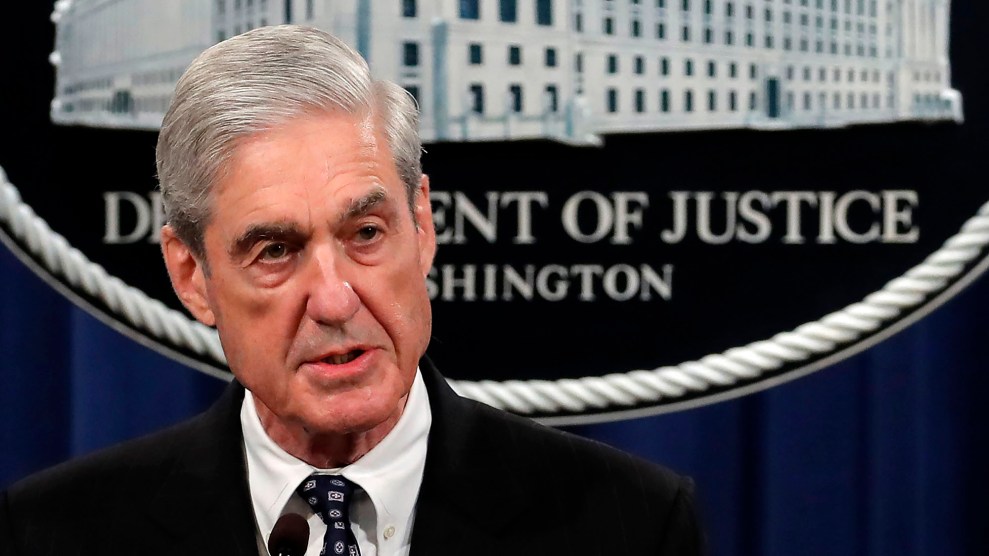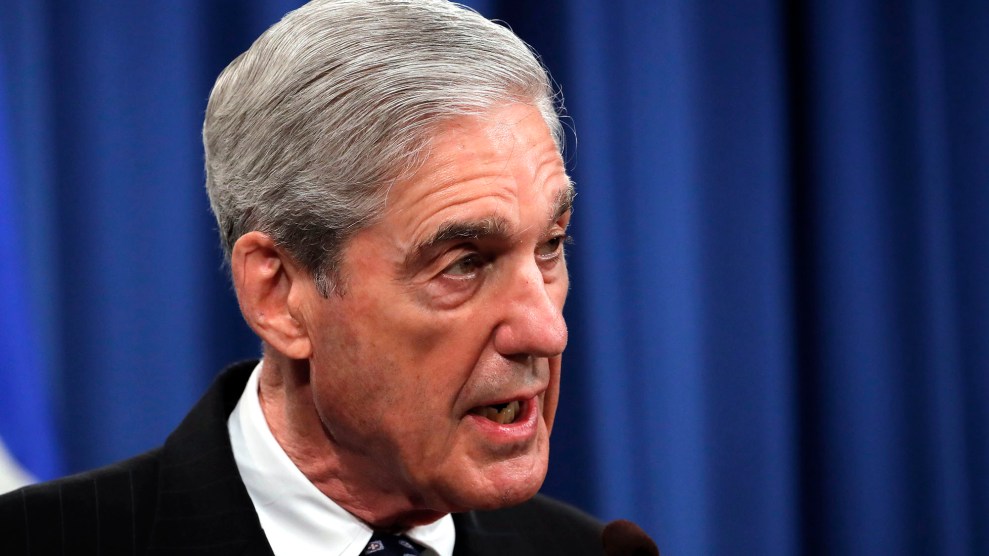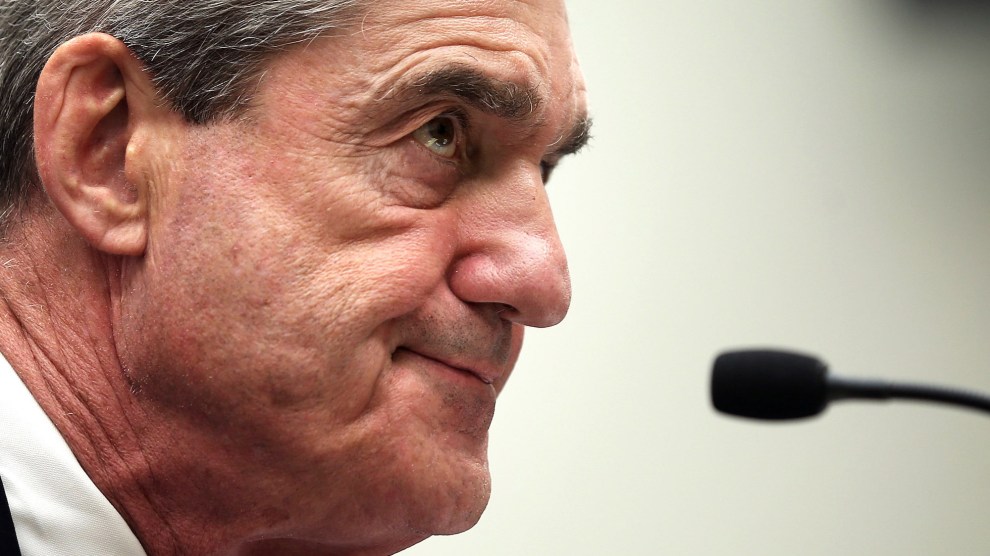
Robert MuellerCarolyn Kaster/AP
When special counsel Robert Mueller appears before the House Judiciary and Intelligence committees on Wednesday, he will, no doubt, be asked about the damning conclusions of his report: Russia engaged in a “sweeping and systematic” attack on the 2016 election; Donald Trump and his aides publicly denied the Russian intervention was occurring but privately sought to benefit from it; Trump, during the campaign, hid from the public his concurrent effort to score a project in Moscow that could reap him hundreds of millions of dollars; and, as president, Trump took steps to derail the Russia probe that could amount to obstruction of justice.
But it is likely that many Republicans on the two committees will do all they can to distract from these core components of the Trump-Russia scandal and will press Mueller on a host of diversionary matters that they and their compatriots in the conservative media have been hyping for the past two years. Their goal is simple: Peddle Deep State conspiracy theories to discredit Mueller and to protect Trump. They don’t have to persuade Americans to achieve their aim; they merely have to turn the Mueller hearings into a circus with unfounded allegations and enraged rants—anything to impede Mueller from clearly conveying the overall message of his report: Russia targeted the 2016 election to help Trump, Trump encouraged and accepted that, and then he sought to stop the investigation.
At every turn in the Russia probe, Trump’s comrades on the right have tried to assist him by claiming the real scandal is the investigation itself and how it began. They assert that Trump has been the victim of a US government cabal that kicked off this inquiry to keep Trump out of office. They have tried mightily to delegitimize the investigation, accusing the supposed Deep State (which apparently includes me) of spying on Trump to do him in.
It’s a good bet that when Republicans get their turn at the microphone during the Mueller hearings, several will seize the moment to advance this propaganda. So here’s a partial guide to some of the crap you can expect to hear from them when Mueller appears before Congress.
The FISA warrant
If you’ve paid any attention to Fox News, you know that that the right-wing proponents of so called “Spygate” are obsessed with an application the FBI submitted in order to surveil Carter Page, a onetime foreign policy adviser to the Trump campaign. Such top-secret warrants are presented to a secret court under the Foreign Intelligence Surveillance Act, and the law requires the feds to provide a judge information that justifies the surveillance. Page was an energy consultant who had done business in Russia; back in 2013, Russian spies had tried to recruit him—and appeared to have failed.
Page eventually found his way into Trump’s small group of national security advisers. And in July 2016, Page, while a Trump campaign adviser, traveled to Moscow, having been invited to give a speech at a prestigious college. There he interacted with several Russian officials. He emailed the Trump campaign that he had gathered “incredible insights” from Russian legislators and senior members of Vladimir Putin’s office. (Mueller would later note in his report, “Page’s activities in Russia—as described in his emails with the [Trump campaign]—were not fully explained.”)
Page also appeared in the memos former British intelligence officer Christopher Steele wrote in 2016 for an opposition research firm working for the Democratic National Committee and the Hillary Clinton campaign. Steele alleged that Page was being used as a go-between connecting the Trump campaign and Moscow and had met with a top Russian energy official to discuss an arrangement under which Trump, if elected president, would lift sanctions on Russia and Page and his associates would get a piece of a major energy deal. (Those claims have not been proven.) And this is what has caused the fuss on the right: The FBI cited the Steele dossier in its FISA application for Page. Sean Hannity and others have expressed outrage over this and have charged that an unsubstantiated report paid for by Democrats was the basis for kicking off surveillance on Trump.
In fact, because a redacted version of FISA application was made public, per a Trump order, we know that the Steele memos were not the sole basis of the submission. Moreover, the FBI did not file this FISA request until October 21, 2016—about a month after Page left the Trump campaign. He was merely a private citizen at this point. (The request was granted—and subsequently renewed several times, under the authority of then-Deputy Attorney General Rod Rosenstein, who was appointed by Trump.)
Even if the FBI erred in citing the Steele memos to obtain a surveillance warrant for Page—and FISA warrant mistakes do deserve scrutiny—this is hardly evidence of an anti-Trump conspiracy within the intelligence community. There were reasons beyond the Steele memos for the bureau to be interested in Page. And Page represented a small slice of the Russia investigation that had already been underway for months. Also, submitting a FISA application two weeks before Election Day—and not leaking word of it—hardly seems the work of a Deep State desperate to squash Trump, who was still considered an underdog. Many of Trump’s most ardent defenders in the House have fixated on the Page FISA application and the Steele dossier and have attempted to whip up shock over this. But this hullabaloo is akin to fretting about a mouse when a bear is at the door. Which brings us to…
The Steele dossier and the investigation
Another component of the conspiracy theory championed by Trump and his handmaids on the right is that the Steele memos are responsible for the FBI’s Russia investigation that Mueller inherited after Trump fired FBI chief James Comey. In January, Trump tweeted, “Remember it was Buzzfeed that released the totally discredited ‘Dossier,’ paid for by Crooked Hillary Clinton and the Democrats (as opposition research), on which the entire Russian probe is based!” A simple factcheck: completely false. Still, when Mueller testifies, Republicans may well bash away at the Steele memos as a stand-in for the Russia investigation itself, suggesting that these documents are somehow responsible for the probe. Their calculation: If you blast apart the memos, you undermine the basis for Mueller’s probe.
But the Steele memos did not trigger the Trump-Russia investigation. And one source for this is none other than Rep. Devin Nunes (R-Calif.), the former chairman of the House Intelligence Committee, who did all he could to hinder, if not wreck, that panel’s own Russia investigation. Remember when Nunes clumsily tried to back up Trump’s unfounded claim that President Barack Obama had wiretapped Trump in his precious tower? In early 2018, Nunes’ staff produced a memo—later publicly released—that tried to make the case the FBI had improperly sought the FISA warrant for Page. Key elements of the memo were debunked. But it did include a nugget that undid much of the right’s conspiracy theorizing. The memo confirmed previous reporting and testimony: The FBI’s Trump-Russia investigation was triggered in late July 2016 when the bureau learned that George Papadopoulos, another Trump campaign foreign policy adviser, had earlier in the year been told by a Russian intermediary that Moscow had thousands of Clinton emails and might weaponize them during the campaign. (Steele did forward his memos, as he wrote them, to an FBI contact during the summer of 2016, but he did not begin seriously talking with the bureau until October of that year.)
Trump has tried repeatedly to tie the Russia investigation to the memos—which contain some outlandish allegations that have been challenged or disproven—to discredit the whole probe. The Steele dossier is a good foil for Trump, a convenient diversion. Focusing on it draws attention from his own actions, particularly how he and his campaign aided and abetted the Russian attack by denying it was happening and by privately interacting with Russian go-betweens (and sending at least an implicit signal to Moscow that the Trump campaign did not mind the Russian intervention). So GOP legislators will probably shoot at the Steele dossier in order to present their competing narrative.
Strzok and Page
Another favorite set of targets for Republicans looking to provide Trump cover are former FBI agent Peter Strzok and former FBI lawyer Lisa Page. The two, who were having a romantic affair, traded texts critical of Trump as they worked on the Russia investigation and the bureau’s probe of Hillary Clinton’s use of a private email server when she was secretary of State. Trump and his crew have cited these texts as evidence that the FBI was out to get Trump from the start—and that the investigation was not begun in good faith.
Trump and his acolytes have brayed about a message Strzok sent to Page describing the Russia investigation as an “insurance policy,” claiming this meant the FBI was hellbent on blocking Trump from winning the White House or thwarting him if he did triumph. A much more benign interpretation seems likelier. As Strzok testified to Congress, some FBI officials advocated a go-slow probe of contacts between Trump’s camp and Russia, noting that Trump probably wouldn’t be elected, but Strzok wanted to move ahead with an aggressive counterintelligence investigation that would examine possible Russian efforts to infiltrate Trump’s inner circle in case Trump won the election. That was the “insurance policy.” He wanted the bureau to be ready on this front in what seemed the unlikely event of a Trump victory.
Still, during a congressional hearing a year ago, Rep. Louie Gohmert (R-Tex.) exploded at Strzok: “The disgrace is what this man has done to our justice system. There is the disgrace. And it won’t be recaptured anytime soon because of the damage you’ve done to the justice system. And I’ve talked to FBI agents around the country. You’ve embarrassed them. You’ve embarrassed yourself. And I can’t help but wonder when I see you looking there with a little smirk, how many times did you look so innocent into your wife’s eye and lie to her about Lisa Page?” The exchange went viral.
Mueller did remove Strzok from the Russia investigation after he learned of the text messages, which did show a personal bias. But there is no indication that Strzok’s or Page’s antipathy toward Trump influenced the investigation. A Justice Department inspector general’s report concluded that their texts did “cast a cloud” over the FBI, but it added, “We found no evidence that the conclusions by department prosecutors were affected by bias or other improper considerations; rather, we determined that they were based on the prosecutors’ assessment of the facts, the law, and past department practice.” Nevertheless, it will be rather surprising if Republicans at the Mueller hearings don’t reprise their attacks on Strzok and Page to draw fire away from Trump.
The big picture
Strzok and Page are only a piece of the uber-conspiracy theory cheered by Trump and his followers. The bottom line of their narrative is this: The FBI, as part of a grand plot, schemed to stop Trump from becoming president, and then, once he was in the White House, attempted to take him out. And the Russia investigation was the main tool for this job.
But…this doesn’t make sense. During the summer and fall of 2016, the FBI knew it was investigating the Russian attack and possible connections between the Trump campaign and Moscow. Did it reveal or leak this information to harm Trump? Not at all. It did the opposite. During an appearance before the House Judiciary Committee on September 28, 2016, Comey was asked repeatedly by Democrats if the bureau was examining links between the Trump campaign and Russia. He stuck to the rulebook and refused to answer the question. Perhaps more important, when the New York Times weeks later was investigating this subject, FBI sources told the paper’s reporters that it had found no ties between Trump and the Russian government. This is not what a Deep State conspiracy to smash Trump would have done. (Meanwhile, Comey revived the Clinton email server controversy in the final stretch of the campaign—a move that damaged Clinton and possibly resulted in Trump’s victory. Another Deep State oops?)
The FBI did not turn its Russia investigation into ammunition against Trump during the campaign. Nor did it do so after the election. It was not the FBI that leaked the Steele dossier—which contained lurid, unsubstantiated allegations about Trump cavorting with prostitutes in Moscow—to Buzzfeed, which posted the memos in early 2017. It was a John McCain aide—and he was horrified when the memos were made public. And shortly before Trump moved into the White House, Comey tried to give the president-to-be a head’s up about the dossier and its salacious contents. There is one inescapable conclusion: If there was a Deep State plotting against Trump, it did a damn poor job.
All of the above may be far too many weeds for the average viewer who tunes into the Mueller hearings. But for the past two years, the Trumpsters have tried conjuring all of this and more (I left out other mind-numbing details) into an alternative reality. A reality in which the Russian attack barely figures and doesn’t matter, in which Trump’s lies about his actions in Russia and his denials and dismissals of the Moscow assault do not exist. The endgame is not persuading America that their bizarre and untrue reality is what actually happened; it’s providing a counter to the damning (for Trump) reality that did transpire. Trump, Fox News, and the rest are purposefully breeding confusion and muddying up what truly is the most significant political scandal in modern American history.
Mueller’s report, though, presents a clear and basic view of what occurred. If his facts cannot be challenged, the Republicans will have to try to impeach his investigation, his people, and perhaps even Mueller himself. And if they cannot do that, the next best thing is to create a mess, make each of the two Mueller hearings a chaotic ruckus with plenty of theatrics, shouting, and conspiratorial charges. The cult of Trump has no choice. He is president in part because of the Russian attack. Worse, he encouraged it and helped Moscow cover it up. He then attempted to block the investigation. Neither Trump nor his supporters can admit this without undercutting his legitimacy. Any serious recognition, consideration, and acceptance of Mueller’s finding is a threat to Trump and his tribe. They need a different script—even if it’s fake.
















